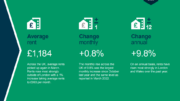Unprecedented tenant demand has been reported by landlords across England and Wales, with the East of England experiencing the highest levels, according to a survey conducted on behalf of Paragon Bank.
The study, which surveyed nearly 700 landlords, found that 67% of them saw increased tenant demand during the first quarter of 2023, marking a new all-time high. This figure has risen from the previous record of 65%, recorded in the last quarter of 2022.
The research also showed that 44% of landlords experienced significant increases in tenant demand, the highest proportion since BVA BDRC began tracking the metric in 2011. Another 23% indicated a slight increase, while only 4% reported a decrease.
In response to the heightened demand, 85% of landlords stated that rents were rising in their letting areas. Over half (52%) of them plan to increase rents across their own portfolios in the next six months, with an average planned increase of 8.2%.
The main reasons cited for raising rents were covering the increased costs of running a property (73%), aligning with local market rates (60%), and increased mortgage finance costs (49%).
Regional variation in tenant demand was observed, with landlords in the East of England reporting the highest levels of increased demand. The South West saw the strongest overall demand for rental properties, with 94% of landlords experiencing strong or very strong interest.
Richard Rowntree, Managing Director for Mortgages at Paragon Bank, commented: “The fact that we’ve seen another high in the proportion of landlords who have told us that they’ve experienced an increase in tenant demand reinforces what I’ve said previously; put simply, we need more private rented sector homes, not less. An important element of this is policy that strikes the right balance between driving up standards and providing tenants with protection while not acting as a barrier to investment.”
Rowntree warned that failure to address this issue could lead to further rental inflation and increased competition for rented homes at a time when affordable housing is more important than ever.






